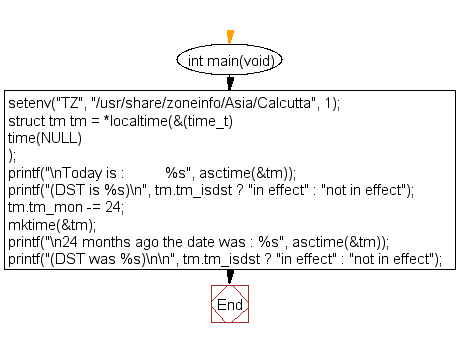C Exercises: Print the date and time before 24 months
C Date Time: Exercise-8 with Solution
Write a program in C to print the date and time before 24 months.
Sample Solution:
C Code:
#define _POSIX_C_SOURCE 200112L
#include <stdlib.h>
#include <stdio.h>
#include <time.h>
int main(void)
{
setenv("TZ", "/usr/share/zoneinfo/Asia/Calcutta", 1);
struct tm tm = *localtime(&(time_t){time(NULL)});
printf("\nToday is : %s", asctime(&tm));
printf("(DST is %s)\n", tm.tm_isdst ? "in effect" : "not in effect");
tm.tm_mon -= 24;
mktime(&tm);
printf("\n24 months ago the date was : %s", asctime(&tm));
printf("(DST was %s)\n\n", tm.tm_isdst ? "in effect" : "not in effect");
}
Sample Output:
Today is : Thu Aug 3 17:27:16 2017
(DST is not in effect)
24 months ago the date was : Mon Aug 3 17:27:16 2015
(DST was not in effect)
N.B.: The result may varry for your current system date and time.
Flowchart:

C Programming Code Editor:
Contribute your code and comments through Disqus.
Previous: Write a program in C to convert a time_t object to calendar time expressed as local time.
Next: Write a program in C to show the first of calendar time.
What is the difficulty level of this exercise?
Test your Programming skills with w3resource's quiz.
C Programming: Tips of the Day
Static variable inside of a function in C
The scope of variable is where the variable name can be seen. Here, x is visible only inside function foo().
The lifetime of a variable is the period over which it exists. If x were defined without the keyword static, the lifetime would be from the entry into foo() to the return from foo(); so it would be re-initialized to 5 on every call.
The keyword static acts to extend the lifetime of a variable to the lifetime of the programme; e.g. initialization occurs once and once only and then the variable retains its value - whatever it has come to be - over all future calls to foo().
Ref : https://bit.ly/3fOq7XP
- New Content published on w3resource:
- HTML-CSS Practical: Exercises, Practice, Solution
- Java Regular Expression: Exercises, Practice, Solution
- Scala Programming Exercises, Practice, Solution
- Python Itertools exercises
- Python Numpy exercises
- Python GeoPy Package exercises
- Python Pandas exercises
- Python nltk exercises
- Python BeautifulSoup exercises
- Form Template
- Composer - PHP Package Manager
- PHPUnit - PHP Testing
- Laravel - PHP Framework
- Angular - JavaScript Framework
- Vue - JavaScript Framework
- Jest - JavaScript Testing Framework
